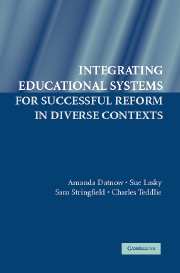Book contents
- Frontmatter
- Contents
- List of Figures and Tables
- Acknowledgments
- 1 Introduction
- 2 School Effectiveness and Improvement
- 3 District-Level Reform Efforts
- 4 Community-Level Reform Efforts
- 5 State-Level Reform Efforts
- 6 The Role of Reform Design Teams
- 7 The Role of the Federal Government in Reform Efforts
- 8 Methodological Issues in the Study of Systemic Integration for Effective Reform
- 9 Discussion and Conclusion
- Bibliography
- Index
8 - Methodological Issues in the Study of Systemic Integration for Effective Reform
Published online by Cambridge University Press: 02 September 2009
- Frontmatter
- Contents
- List of Figures and Tables
- Acknowledgments
- 1 Introduction
- 2 School Effectiveness and Improvement
- 3 District-Level Reform Efforts
- 4 Community-Level Reform Efforts
- 5 State-Level Reform Efforts
- 6 The Role of Reform Design Teams
- 7 The Role of the Federal Government in Reform Efforts
- 8 Methodological Issues in the Study of Systemic Integration for Effective Reform
- 9 Discussion and Conclusion
- Bibliography
- Index
Summary
A topic that runs throughout this volume is the lack of research literature specifically devoted to the education of linguistically and culturally diverse students. In the most general terms, this is an equity issue imbued with methodological challenges. Generic effectiveness research asks, “What makes a school or district effective for all students?” Equity-oriented research asks: “What makes a school effective for particular subgroups of students who have been historically underserved?”
Many intertwined methodological issues are related to this topic. The most obvious one is sampling, which boils down to questions related to the disaggregation of school-level data. Other methodological issues include the use of mixed methods (both quantitative and qualitative), the measurement of the intervention, the need for multiple outcome measures, and validity considerations.
A BRIEF HISTORY OF SAMPLING ISSUES
In Chapter 1, a case is made for the continued importance of the school level as the unit of change and analysis in educational reform literature. However, we have also consistently emphasized the education of racially and linguistically diverse students. The distinction between school-level analysis and data analyses disaggregated by subgroups has been addressed in several iterative stages over the past thirty years.
The initial “effective schools” research had an equity focus and involved case studies of schools serving primarily low-SES students in urban areas. The original five correlates of effective schooling emerged from this research (e.g., Brookover 1985; Edmonds 1979; Lezotte and Bancroft 1985).
- Type
- Chapter
- Information
- Publisher: Cambridge University PressPrint publication year: 2006



